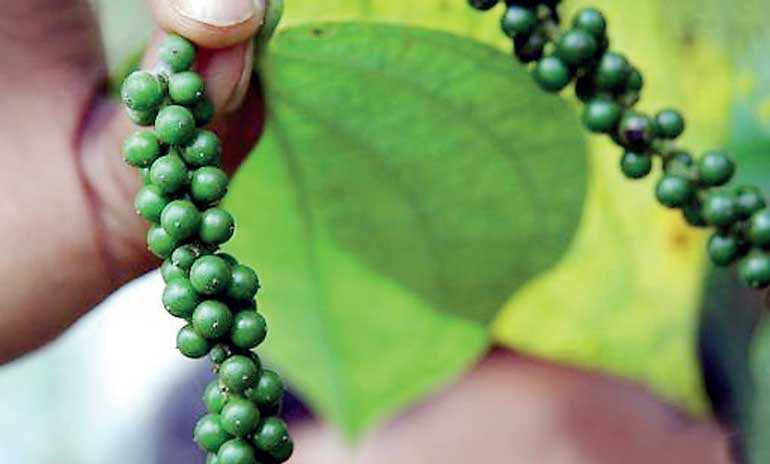Thursday Feb 19, 2026
Thursday Feb 19, 2026
Monday, 2 March 2020 02:14 - - {{hitsCtrl.values.hits}}

By J.A.A.S. Ranasinghe
The Government has, at last, woken up from the deep slumber over the plummeting of pepper prices to the rock bottom and called for a report from the Export Development Board (EDB) as to how the price of pepper has been on a declining trend despite the ban on imported pepper.
The pepper cultivators have virtually abandoned pepper cultivation, as it was not economical to grow pepper despite the numerous incentives given by the Department of Export Agriculture. As a matter of fact, the declining of pepper prices became a volatile issue at the last Presidential Election and it appears that pepper cultivating districts demonstrated their anger and frustration by voting against the previous regime.
The plummeting of pepper prices has had a deleterious trend as seen in the following table in that the extent of land under cultivation, production and productivity have seen a downward trend as a result of the poor market prices.It is rumoured that a company related to a powerful Minister in charge of the subject had imported low-quality pepper in large quantities from Vietnam for re-export purposes and partly released a substantial quantity to the local market, thus depriving the local cultivators.
It is a matter for concern that good quality pepper is still exported in raw-form without value addition being made, though the process of value addition is not a rocket science as far as the pepper value addition is concerned.
It is hoped that the EDB would submit a comprehensive report giving not only the reasons for the declining trend of pepper prices but also the far-reaching proposals as to how it intends strengthening market strategies for the benefit of the pepper cultivators. It is more beneficial, if the report of the EDB is given publicity for the information of the general public and the pepper cultivators.
It would be naïve to believe that the question of non-remunerative prices is the one and only malady the pepper industry is afflicted with. Sri Lanka has earned a nitch name for black pepper in the world market because of its qualitative ingredients and aroma but Sri Lanka has failed to add value additions in order to obtain a premium price in the world market for the last few decades.
It would be naïve to believe that the question of non-remunerative prices is the one and only malady the pepper industry is afflicted with
The importers (foreign countries) of our black pepper took the advantage of our weakness and thrived their business by re-exporting the value-added pepper under their brand names. The Department of Export Agriculture has been performing all the spadework by assisting the pepper growers by way of subsidies, planting materials, extension support, fertiliser inputs etc. but it has washed its hands when it comes to marketing of pepper, the final produce leaving the unscrupulous merchants to exploit the pepper growers.

To add insult to injury, the Department of Export Agriculture now says the pepper cultivation in the Badulla, Monaragala, Kandy and Ratnapura districts is afflicted with two diseases – Quick Wilt and Vine Borer – causing a major threat to the pepper industry. The above four districts are major pepper growing districts and if these two diseases are not nipped in the bud, it would definitely have a disastrous impact not only on the economy but also on the hapless peppers growers who have been battered severely as a result of the plummeted prices of pepper. This is a case of double whammy.
Spices and Allied Products Producers and Traders Association Founder/Chairman Gulam Chatoor has made a valiant effort by way of a proposal to remove the minimum import price of Rs. 500 per kg India has imposed from pepper imports from Sri Lanka, subsequent to the stoppage of import of pepper from foreign countries. I believe, the Prime Minister would have taken up this issue with his counterpart in India in the bilateral talks.
His Excellency, in his election manifesto – Vistas of Prosperity and Splendor – has set apart a special recognition for the promotion of pepper cultivation and marketing in that he has assured technical support, subsidised loan schemes, establishment of export villages, extension services to improve pepper cultivation. He has already acted upon on his pledge by banning the importing of pepper, no sooner he came to power.
However, the benefits of the banning of imported pepper have not yet passed to the pepper cultivators and the pepper prices remain low during the last three months, thus raising questions whether there is a hidden agenda or cartel within the wheels of the pepper business. The EDB, we expect, why the beneficial effects of the banning of pepper imports have not been passed on to the growers, in its reports to the Parliament.
Vietnam, a leading producer and an exporter of pepper has made far-reaching strides in the sphere of pepper cultivation and value additions and it is a moot point why our Department of Export Agriculture cannot follow suit with the research and development backing of our research institutions and universities. This is an area that the new Minister of the Department of Export Agriculture should embark on by giving all the support to the employees of the department.
Majority of the pepper growers have no any other livelihood income and today they have become destitute, as their unutterable grievances have not yet received due duress. Invariably, these destitute would become prostitutes, if timely action is not taken to provide an economic and financial relief. Over to the new Minister.
(The writer can be reached at [email protected].)